Springtime in New York carries waves of diplomats into town to attend the annual meetings of the UN Commission on the Status of Women, the UN’s principal body promoting gender equality.
Before her first time at the meetings this March, Sabrina Hsieh (謝璿), like most young Taiwanese, had only a remote understanding of the country’s diplomatic isolation and its exclusion from the UN since 1971.
“There was a little sadness because in that setting, you are nobody. You can’t even happily say to others, ‘Hi, I’m from Taiwan.’ You have to study their expression and then decide how frank you want to be with them,” Hsieh says.
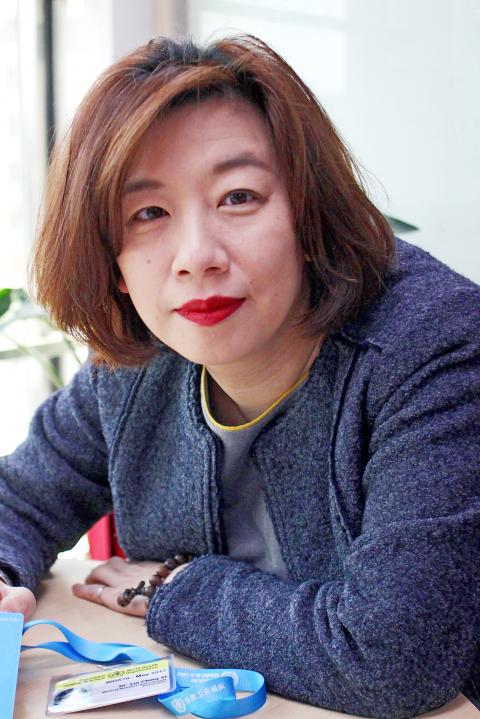
Photo: Davina Tham, Taipei Times
At home, the third-year university student is a youth activist for women’s economic empowerment. Last month, assisted by the Foundation for Women’s Rights Promotion and Development, she traveled to New York to attend unofficial civil society events held concurrently with the official UN meetings.
Taiwan has for decades been forced to pursue alternative pathways to participate in the international community. The best alternatives capitalize on Taiwan’s strengths and draw on sustained work being done even without government intervention. Efforts toward women’s empowerment and gender equality are emerging as an important locus for international participation.
Close to 50 Taiwanese representatives, chiefly comprising NGO professionals and academics, turned out in force for the UN Commission on the Status of Women this year. They build upon Taiwan’s 20-year presence at the forum, pioneered in 1999 by Chang Chueh (張玨), a veteran women’s rights activist.
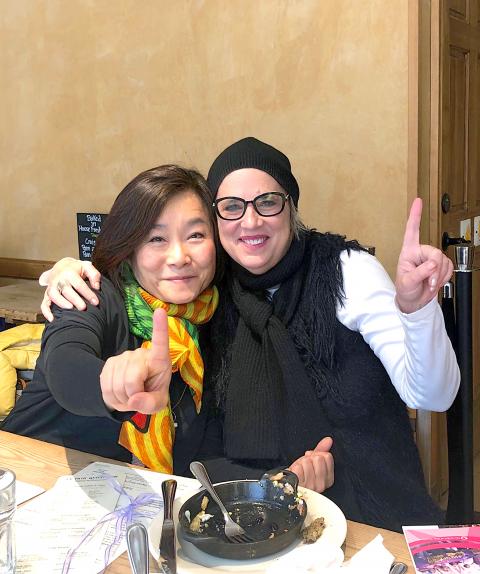
Photo courtesy of the Garden of Hope Foundation
With more breathing space than officials, gender equality activists are in a position to enlarge Taiwan’s role in the international community, and the government is taking notice.
Hsieh got to introduce an international audience to her work, and returned home eager to do even more for women and girls here.
TRANSNATIONAL EXCHANGES
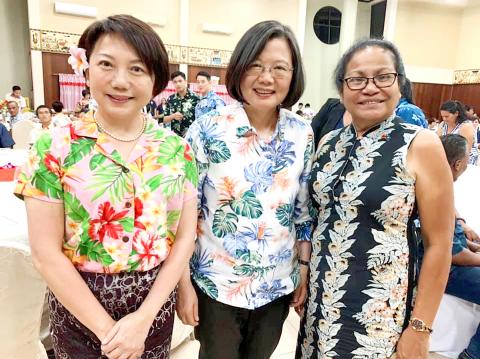
Photo courtesy of Fan Yun
The UN does not allow Taiwanese passport-holders to enter UN buildings where official meetings are held. Its participation is limited to the unofficial parallel events — spaces for NGOs commonly held on the sidelines of major UN conferences.
There are a few exceptions. Some of Taiwan’s most experienced advocates have positions in international NGOs that can open doors to observe official meetings. Delegates with dual nationality can also enter using another passport from a UN member state.
But in unofficial settings like the parallel events, doing the work matters more than having the right passport. And this works in Taiwan’s favor.
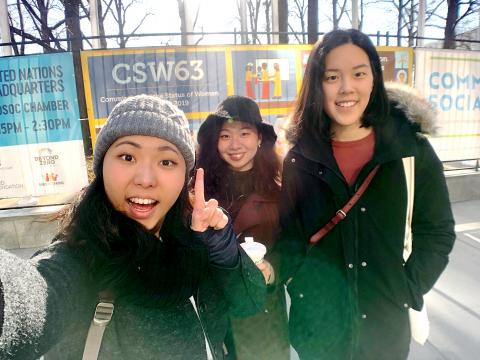
Photo courtesy of Foundation for Women’s Rights Promotion and Development
When it comes to gender equality, Taiwan has considerable clout as a progressive Asian society. While its reputation is headlined by the 2016 election of Taiwan’s first female president and an impressively high 38.1 percent of legislative seats are held by women, grassroots work rather than political representation is what keeps the conversation going with other countries.
“I do believe that exchanges at the citizen level and among NGOs are more powerful than diplomacy,” says Chi Hui-jung (紀惠容), CEO of the Garden of Hope Foundation.
The foundation’s parallel event this year — socio-cultural attitudes that blame and shame victims of sexual violence — rode the momentum of the #MeToo movement to examine gender-based sexual violence in Asian communities, with speakers from Taiwan, Japan and the foundation’s New York arm.
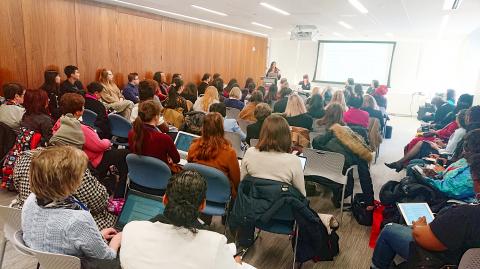
Photo courtesy of the Garden of Hope Foundation
In November, the Garden of Hope will host the fourth World Conference of Women’s Shelters in Kaohsiung. Some 1,500 people from 120 countries are expected to come together to discuss how shelters are tackling gender-based violence.
The ability to bring internationally-renowned activists to the table and convene global NGO meetings suggests that Taiwan’s non-government sector is punching above its weight in the gender equality movement.
Chi invited prominent US feminist activist Eve Ensler, best known as playwright of The Vagina Monologues, to speak at the conference in New York.
Annie Chang (張琬琪), researcher at the Foundation for Women’s Rights Promotion and Development, says that the different modus operandi for Taiwan’s delegation also has practical advantages.
“There are few countries like us [whose NGOs have] such close proximity to and remain constantly in touch with government officials,” Chang says, adding that this gives NGOs more opportunity to sensitize officials to their priorities and insights.
ACTIVIST AMBASSADORS
The government recognized early on that citizen and civil society exchanges are important, and in recent years has taken more concerted action on this front.
Traveling on a government grant in 2004, Chi established the New York arm of the Garden of Hope Foundation, which shelters female victims of human trafficking and domestic or sexual abuse in New York’s Chinese community.
More recently, President Tsai Ing-wen (蔡英文) appointed Fan Yun (范雲), associate professor at the NTU Department of Sociology and convener of the Social Democratic Party, as Taiwan’s first ambassador-at-large for women’s empowerment.
After visiting New York for the UN Commission on the Status of Women, Fan accompanied Tsai on a whirlwind official tour of three diplomatic allies in the South Pacific from March 21 to March 28.
Fan shines a spotlight on progressive legal protections for women, high female political participation and gender equity education to show that Taiwan is not just a “newcomer” country, but has made notable advances in democratic values and quality of life that shape how other countries can engage with it.
Democratic Progressive Party legislator Lin Ching-i (林靜儀), who has attended parallel events at the UN Commission on the Status of Women since 2012, agrees that Taiwan cannot be absent from international discussions on gender equality.
Given Taiwan’s above-average track record in women’s empowerment and wealth of experience to share, there is mutual benefit in engaging interested groups and activists.
The international community must know that when it comes to gender equality, “Taiwan is a good example, and Taiwan is a good partner,” Lin says.

William Liu (劉家君) moved to Kaohsiung from Nantou to live with his boyfriend Reg Hong (洪嘉佑). “In Nantou, people do not support gay rights at all and never even talk about it. Living here made me optimistic and made me realize how much I can express myself,” Liu tells the Taipei Times. Hong and his friend Cony Hsieh (謝昀希) are both active in several LGBT groups and organizations in Kaohsiung. They were among the people behind the city’s 16th Pride event in November last year, which gathered over 35,000 people. Along with others, they clearly see Kaohsiung as the nexus of LGBT rights.

Jan. 26 to Feb. 1 Nearly 90 years after it was last recorded, the Basay language was taught in a classroom for the first time in September last year. Over the following three months, students learned its sounds along with the customs and folktales of the Ketagalan people, who once spoke it across northern Taiwan. Although each Ketagalan settlement had its own language, Basay functioned as a common trade language. By the late 19th century, it had largely fallen out of daily use as speakers shifted to Hoklo (commonly known as Taiwanese), surviving only in fragments remembered by the elderly. In

Dissident artist Ai Weiwei’s (艾未未) famous return to the People’s Republic of China (PRC) has been overshadowed by the astonishing news of the latest arrests of senior military figures for “corruption,” but it is an interesting piece of news in its own right, though more for what Ai does not understand than for what he does. Ai simply lacks the reflective understanding that the loneliness and isolation he imagines are “European” are simply the joys of life as an expat. That goes both ways: “I love Taiwan!” say many still wet-behind-the-ears expats here, not realizing what they love is being an

In the American west, “it is said, water flows upwards towards money,” wrote Marc Reisner in one of the most compelling books on public policy ever written, Cadillac Desert. As Americans failed to overcome the West’s water scarcity with hard work and private capital, the Federal government came to the rescue. As Reisner describes: “the American West quietly became the first and most durable example of the modern welfare state.” In Taiwan, the money toward which water flows upwards is the high tech industry, particularly the chip powerhouse Taiwan Semiconductor Manufacturing Co (TSMC, 台積電). Typically articles on TSMC’s water demand